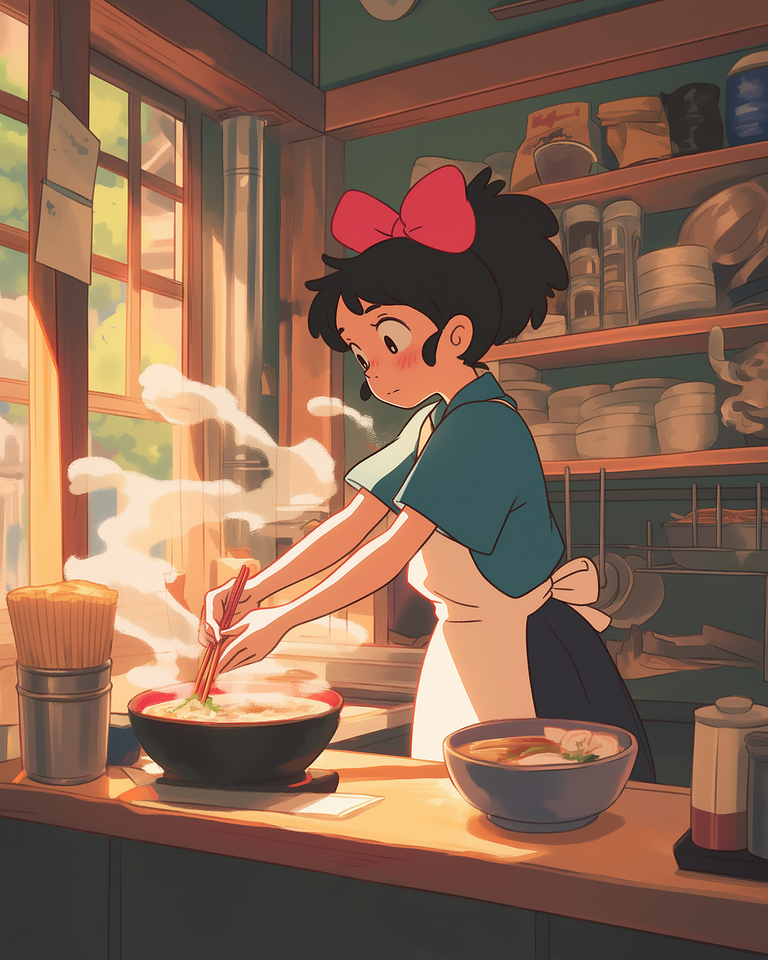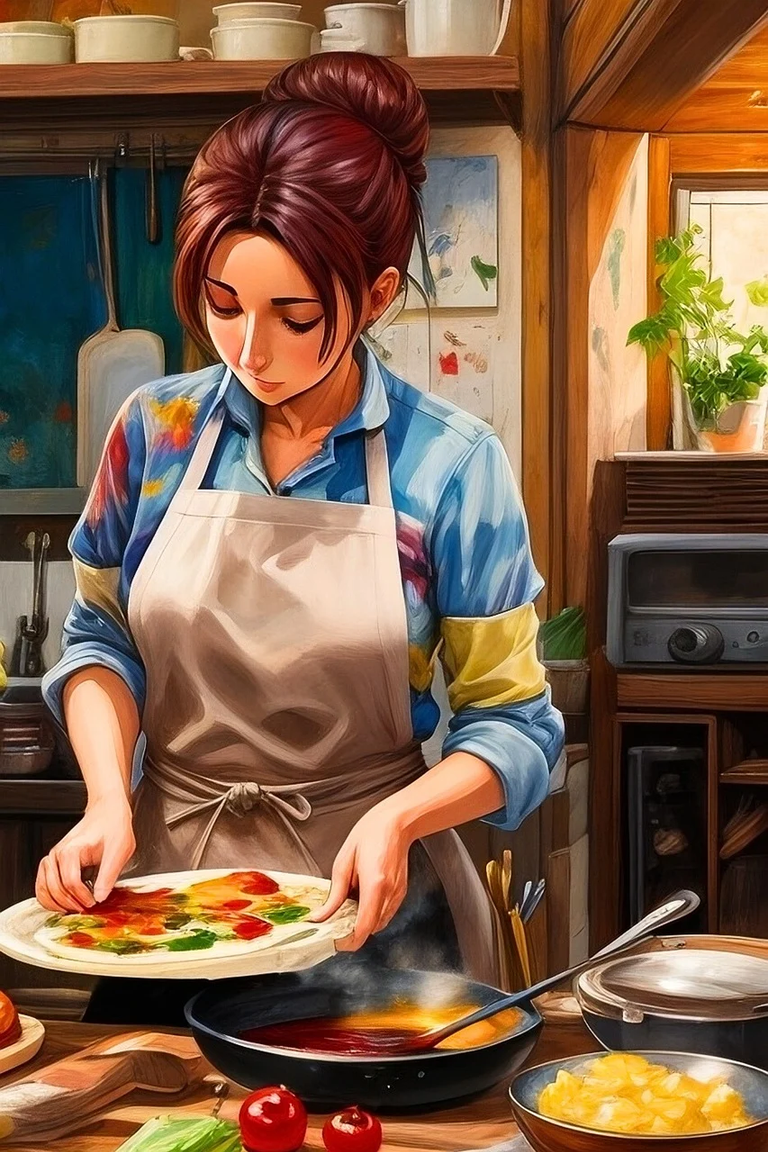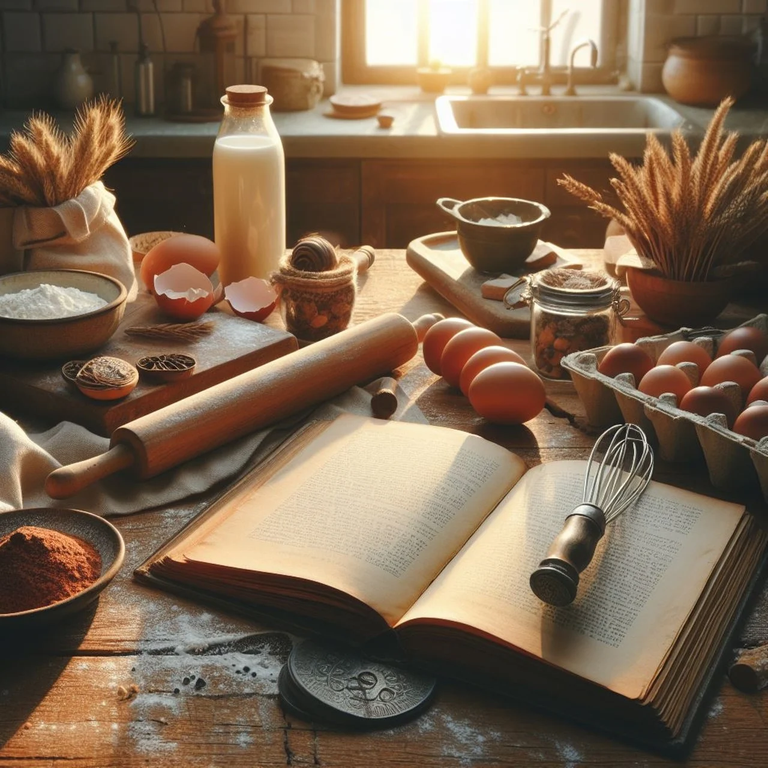Creative Nonfiction: Recipes for crying/ Recetas para el llanto

Recipes for crying

Among the things we had to do was the cooking. Although we knew the basics, we had never before prepared a chicken, a meat, a soup. So my mother, every night, would guide us in the recipes:
"You're going to take the rice, you're going to pick it out and then you're going to wash it. After the water boils, you pour it into the pot and put it over medium heat". My mother explained patiently, showing us each of the utensils we had to use.
"On this board you are going to chop the chicken into small pieces and on another board, don't use the same board where you chopped the chicken, you are going to chop the vegetables,” and my mother went through the motions of how to cut each one of the things.

"What's cooking today, would Mom bring down the chicken?" -I thought instead of thinking about polynomials, about V=d/t, about verbs and adjectives, about the elements of the periodic table.
I didn't have friends either because when I got out of class I had to run home to prepare lunch, so I usually had to do the work alone or if I did it in a group, I was the one who knew the least and I felt very sorry for not being attentive to the explanations.
Arriving home was also a stress because it was not only cooking, it was also mopping, picking up clothes, folding. I felt sad, disoriented and I was almost always sweaty, with dirty clothes and in a bad mood. My parents worked and arrived at night, so we had to be in charge, keeping order until they arrived. Mom would take off her clothes, eat and then set about tidying up for the next day:
"Tomorrow it's time to make potato salad",_ she would announce, and it was starting the cycle all over again, the race, once more.

I was the last one to turn in and the sheet was almost blank: I had done almost nothing. I left very puzzled and immediately went home. Nobody was home, so I went straight to the kitchen, mechanically, like a robot. Like a robot I took the spaghetti and started to wash it, I washed it so much that it became a sticky paste inside the boiling water. In my head, my mother's instructions came to me: “Wash them and throw them into the hot water”. I didn't remember that it was the recipe for rice and not for spaghetti.

"Why did you go away, maíta, and leave me alone, why, why, why, why, why,” I asked again and again, with no answer and with accumulated pain.
1988 was a year of many responsibilities, of many bad recipes, of getting low grades, of much crying, but of overwhelming maturity. My grandmother's death marked the beginning of a new era: my maturity.

All images are free of charge and the text is my own, translated in Deepl


Thank you for reading and commenting. Until a future reading, friends
![Click here to read in spanish]
Recetas para el llanto
A mí no me dio tiempo de llorar bien a mi abuela, a acostumbrarme a su muerte, a aceptar su ausencia, porque en el mes de su muerte, comenzaban las clases del liceo y debía prepararme para el reto académico que estaba por comenzar. También, porque de la noche a la mañana, por la muerte de mi abuela y por orden de mamá, mis hermanas y yo debíamos asumir responsabilidades dentro de la casa. Todas las cosas que había hecho mi abuela toda la vida, en su ausencia, las haríamos nosotras.
Entre las cosas que debíamos hacer era la comida. Si bien sabíamos lo elemental, nunca antes habíamos preparado un pollo, una carne, una sopa. Por lo que mi madre, cada noche, nos orientaba en las recetas:
_Vas a tomar el arroz, lo vas a escoger y luego lo vas a lavar. Después que hierva el agua, lo echas a la cazuela y lo pones a fuego medio. Explicaba mi madre con paciencia, enseñándonos cada uno de los utensilios que debíamos utilizar.
_En esta tabla vas a picar el pollo en pedazos pequeños y en otra tabla, no uses la misma tabla donde picaste el pollo, vas a trocear los vegetales – y mamá hacía los movimientos de cómo debía cortar cada una de las cosas.
Dentro del salón, por más que intentaba prestar atención a los profesores, mi mente volaba a la cocina y a las cosas que debía preparar cada día:
_¿Qué es lo que toca cocinar hoy? ¿Mamá bajaría el pollo? –pensaba yo en vez de pensar en polinomios, en V=d/t, en verbos y adjetivos, en los elementos de la tabla periódica.
Tampoco tenía amigos porque al salir de clase debía salir corriendo a mi casa a preparar el almuerzo, por lo que generalmente debía hacer los trabajos sola o si lo hacía de manera grupal, yo era la que menos sabía y me sentía muy apenada por no estar atenta a la explicaciones.
Llegar a casa también era un estrés porque no solo era cocinar, también era trapear, recoger ropa, doblar. Me sentía triste, desorientada y casi siempre estaba sudada, con la ropa sucia y de mal humor. Mis padres trabajan y llegaban en la noche, por lo que nosotras teníamos que estar al frente, mantener el orden hasta que ellos llegaran. Mamá se quitaba la ropa, comía y luego se ponía a ordenar las cosas para el día siguiente:
_Mañana toca hacer ensalada de papas –anunciaba y era comenzar el ciclo otra vez, la carrera, una vez más.
En una oportunidad, recuerdo, que llegué al liceo y había un examen de física. No sabía que había examen, así que no había estudiado nada. Tomé temblando la hoja que el profesor me daba y cuando vi las fórmulas, los números comenzaron a danzar frente a mis ojos como si se estuvieran burlando de mí: mi cerebro estaba en pausa.
Fui la última que entregué y la hoja estaba casi en blanco: no había hecho casi nada. Salí muy desconcertada y me fui inmediatamente a mi casa. En casa no había nadie, así que me fui directo a la cocina, de manera mecánica, como un robot. Como un robot tomé los espaguetis y comencé a lavarlos, los lavé tanto que se volvieron una pasta pegajosa dentro del agua hervida. En mi cabeza, me venían las instrucciones de mi madre: “Lávalos y échalos al agua caliente”. No recordaba que era la receta del arroz y no de los espaguetis.
Sin mucha coordinación, empecé a picar el pollo en trozos muy pequeño con tan mala suerte que el cuchillo cortó uno de mis dedos. La sangre del pollo y la mía, por un instante, hicieron una imagen surrealista en la tabla de picar. Fue en ese instante, que sentí que toda la tristeza se me venía encima.
Con el dedo cortado, me senté en el piso y comencé a llorar: lloraba por todas las obligaciones que tenía en la casa, por los benditos espaguetis que parecían una masa blanca dentro del agua hirviendo, lloraba por el examen de física, pero muy especialmente: lloraba por mi abuela muerta, una abuela que había sido tan importante como una madre para mí y no había tenido tiempo de llorar.
1988 fue un año de muchas responsabilidades, de muchas recetas mal hechas, de obtener bajas calificaciones, de mucho llanto, pero de una madurez abrumadora. La muerte de mi abuela marcaba el comienzo de una nueva era: mi madurez.
Thank you very much for your appreciation. Happy and honored. Success
A casi todos nos llega ese momento en la vida cuando estás obligado a madurar. El mío fue cuando decidí ir a estudiar a la Universidad lejos de casa (hasta de mi país) y tuve que aprender a valerme por mí mismo.
Pudo haber sido difícil, pero se agradece.
Cómo siempre, un gozo leerte. 🌻
Yes, I think that at the beginning we don't see how much we grow with new challenges, only later, with time, we manage to see that those challenges were necessary for our growth. Thank you very much for your comment! Regards